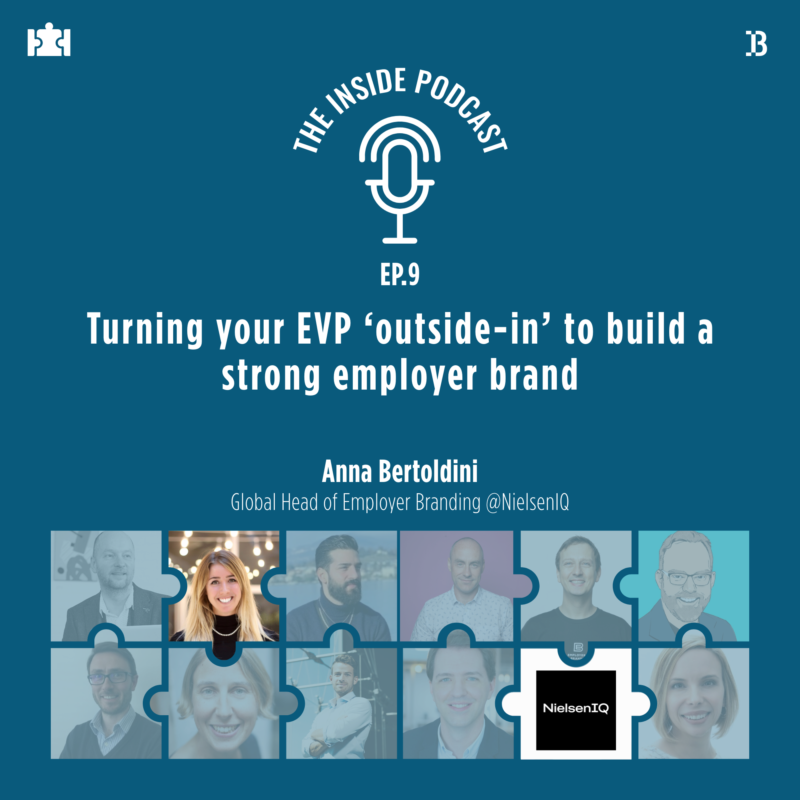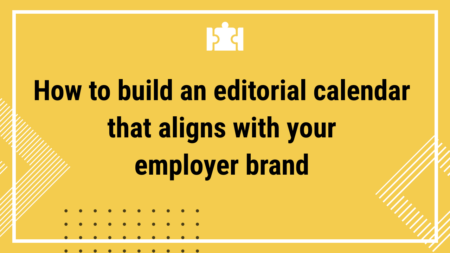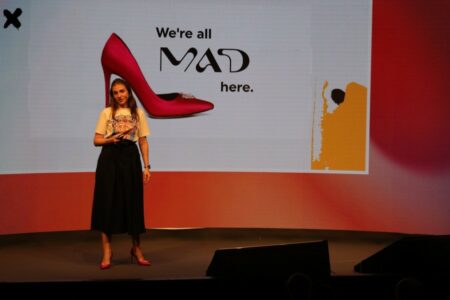Hi, my name is Georgiana. I am the CEO and founder of Beaglecat, and soon you will be listening to Employer Branding: The Inside Podcast. In this podcast, I regularly talk to employer branding managers and acquisition managers, and human resources managers in tech companies in Germany, Romania, and the US. For more content on employer branding-related themes, go to employerbranding.tech or beaglecat.com. Stay tuned!
Overview
In the 9th episode of #EmployerBranding: The Inside Podcast (season 6), we had the opportunity to speak with Anna Bertoldini, Global Head of Employer Branding at NielsenIQ. We talked about strengthening your #employerbrand by turning your EVP ‘outside-in’, but also about #flexibility, #adaptability, what makes a great brand story, and a lot more.
What you’ll learn by listening
- How to strengthen your employer brand by turning your EVP “outside-in”
- What makes a good brand story & how it can be localized across different cultures
- Why adaptability & flexibility are critical when building a global employer brand
- Creating emotional connection and fostering empathy: key to successful storytelling in employer branding
- Where does employer branding belong – in HR or in marketing?
- Candidate experience: useful insights worth taking into account
About NielsenIQ
NielsenIQ is a global information services company providing the most complete and trusted view of consumers and markets in 90 countries covering 90% of the world’s population. Focusing primarily on consumer packaged goods manufacturers and fast-moving consumer packaged goods and retailers, we give customers the power to defy what’s possible. Our approach allows us to connect the dots that others can’t see and build the bigger picture that others miss.
How? We combine unparalleled datasets, pioneering technology, and the brightest minds in the industry, to create insights that don’t just make bold decisions possible, but necessary. Everything we do is focused on putting you in the position to transform how sectors and industries see themselves.
Podcast link – Enjoy listening on Spotify!
Podcast transcription – Employer Branding T.I.P S06Ep.09
Georgiana:
Hi, everyone! Georgiana here with Employer Branding: The Inside Podcast. This is the end of our 6th season. The closing guest this season is someone that I’ve been following on LinkedIn for a very long time. Someone that I admire a lot and who puts a lot of useful content on employer branding themes out there. So I’m super excited to have her with us today to share part of her knowledge with us. Her name is Anna Bertoldini. And she is the Global Head of Employer Branding at NielsenIQ. Hi, Anna! Thank you so much for being with me today.
Anna Bertoldini:
Hi, the pleasure is all mine. Thank you.
Georgiana:
I would like, first, Anna to let us know what The Global Head of Employer Branding for such a huge company does, what does your regular day involve? I’m really curious.
Anna Bertoldini:
Yeah, of course. So my role is global, although I live in Barcelona, Spain. Currently, I’m leading our global employer branding and recruitment marketing efforts at NielsenIQ. So I’m actually quite new at the company. I’ve been here for a little over a year. And my role has really been to bring our EVP to life across our candidate journey and employee lifecycle; as well as position NielsenIQ as a top employer globally. So that goes for anything from reputation management, content development, employee advocacy, social media, recruitment, marketing, branding, etc. So it’s a little bit of a mix, but a lot of it so far has been building our global employer brand. And now it’s time to scale.
Georgiana:
And that means you went into employer branding rather recently although you’ve been working in the field for quite a while, right?
Anna Bertoldini:
Yes, yes. I’ve been in employer branding now for a few years. But it is my most recent position in it. And it’s one of the biggest challenges I faced but in a really good way and exciting way.
Georgiana:
Cool, cool. I’m sure everyone is curious, just as much as I am, to see how NielsenIQ approaches Employer Branding. I know that maybe not everything can be told about how a company tackles Employer Branding. But I’m curious, what was it like for you working there in employer branding, on the one hand, and then if there are strategies or I don’t know policies that you’ve implemented, and that you feel have made a difference during your one year with the company?
Anna Bertoldini:
Absolutely. Employer branding at NielsenIQ is a strategic function that focuses on optimizing and catering to key client experiences, our clients and talent brand being candidates, employees, recruiters, and hiring managers. So we really aim to define and rollout our messaging on why you should work here, equip our recruiters and hiring managers with what they need to provide a positive and consistent experience to our candidates, also empower our employees with the knowledge and tools to tell their story to the world if they wish to, of course. A big project we’re working on right now is to turn our EVP outside in. A lot of the external work has been done. So rolling it out, externally, once it was finalized at the beginning of 2022. Our EVP is quite new, I think now it’s basically one year old. So it’s been rolled out externally.
Georgiana:
Your project, right? Or child project, or how should they call it?
Anna Bertoldini:
It’s my baby. Yeah, I call it my baby. Although I wasn’t part of its development, I joined the company right when the EVP was finalized. The company worked with an agency before and a part-time consultant, and then I jumped in when it was locked and loaded and ready to go. So my role was to really bring it to life. And now, the new challenge is to turn it outside in, so making sure we’re internal first in our thinking, and we’re establishing a vibrant and engaging culture. So creating that excitement in our own people before anyone else. And to me, employer branding really starts from within, so it’s super important for me because if your own people believe your brand, then everyone else will, and it will permeate on the outside. So that’s going to be a big focus for 2023.
Georgiana:
Absolutely, and honestly, I think it’s the focus that every company should take. Because in the end, your employees are your biggest brand ambassadors. And your biggest source of referrals. People should learn from you guys. And I checked your LinkedIn. A while ago, a long time before we spoke. I saw that you read in no less than six countries. Wow. And you traveled to 40. Plus, well, more than 40 countries. Obviously, and you also talk a lot about storytelling. And I’m wondering, what makes a good brand story? And how do you localize it across so many different cultures?
Anna Bertoldini:
That is such a good question. I think living in so many countries has been quite a ride because nothing was really planned in my life. I always just kind of went with the flow and grabbed opportunities as they came. But that really taught me a lot about integration and having to really face different cultures. And you know, not just being exposed to them, but really having to understand them, and adapt to them.
To me, a good brand story is one that creates a feeling of like-me and its audience. And that means something different to everyone. It’s about showing the world why your brand is unique, and what makes it unique in a way that engages people and highlights how the brand is built, authentic, and relatable. So to me, localizing across different countries means making it relatable, and inclusive to people in different markets, taking culture, language, and communication into account. So having a global brand story and guidelines is essential, but also leaving that room, especially if you work for a global company.
And you know, you have a central global employer brand, it’s very useful to leave room for flexibility and allow for local offices and teams and functions to adapt it to their audiences. So the local version, let’s say, of your global brand guidelines should bring context, authenticity, and perspective to a more centralized theme, which is your global brand narrative. And that’s really to cater to different audiences. Because a story can mean different things to different people, and being able to localize and allow that freedom in your local marketing, recruitment, and hiring manager teams is essential, as making sure that different candidates, not just understand it, but also resonates with them.
Georgiana:
Well, yeah, I absolutely agree. I think the key here is context. Actually, you know, in my agency, we work with a lot of companies who come to Romania, for example, or to Germany and try to recruit people and are always the one who takes what’s been centrally developed in terms of the employer brand. And then, you know, approach it in a local weigh local context, whereas the others who are very stiff in their maintaining the main global direction, automatically fail. So it’s, yeah, it’s indeed context, and looking at the culture in particular, I think is key to the company’s success.
Anna Bertoldini:
Yeah, and a lot of times people rely on local agencies to create content, collateral, and assets and resources materials. And that’s great if you have the budget to rely on local agencies to do that for you. That’s amazing. But not every company and employer branding team has that kind of budget. So really, yeah, really allowing for that flexibility, providing some guidelines for people to follow, but then allowing them to have some room and flexibility to make any changes and adapt is going to be key. So that recruitment teams can really have what they need to really attract those different audiences and candidates.
Georgiana:
Indeed, indeed. In the end, it’s not even about working with agencies just reaching out to the people working in certain hubs and asking them to contribute to the local employer brand for them. But I am wondering, there’s a lot of talk about storytelling in employer branding, try to convey your brand in a story that matters. We’ve heard it so many times. How would you bring these sentences? Or how would you approach this in a very concrete way? Do you have any tips when it comes to building your employer brand in a story-like manner?
Anna Bertoldini:
Yeah, that’s a really great question. I always say that culture is really hard to define. And to me, it’s the combination of special moments and experiences that people will experience, and feel within your company. It’s the combination of different stories of your people. And so bringing those moments to life and promoting the moments, pride the traditions, you know, the winds, the failures, and the learnings teams live and breathe each day is going to be key to that storytelling.
So storytelling is really, to me, a way to create an emotional connection with your audience and foster empathy. So feeling once again that people want to be able to relate to those stories. So allowing your employees to speak up and allowing them to have to tell your story and your own unique voice is going to be key here. And in doing storytelling, I mean, yeah, like, for example, our main audience in talent branding, as I said, are candidates and a lot of candidate decisions are driven by emotion across their journey.
Logic obviously plays a part in their thinking. But ultimately, emotion is what makes them make those decisions. Like, for example, when they see an ad and click on it, when they read a job description, I want to click Apply. And when they go through the recruitment process and want to accept the offer, because they like the hiring team. That’s because of the human and authentic way you portray your brand and your narrative. And that’s through people.
Georgiana:
I agree. If we step away from storytelling for just a little bit, I’m wondering, what’s your take on employer branding, being part of the HR department, because I’ve seen it so many ways. And one of the last organizations that I worked in, it was actually attached to marketing, working with HR, but in the marketing department. So I see that companies approach it differently. What’s your take on this confusion, if I can call it that way?
Anna Bertoldini:
Yeah, and I’ve heard HR marketing in so many different contexts. And let me tell the world out there. Employer Branding is not an HR initiative. Effective employer branding is just as vital to the success of a company as corporate brand building. It’s a vital piece of the overall business strategy. So when I hear HR marketing, sometimes I’m like, No, that’s not right. Also, because employer branding can sit in many teams, often not always, it does sit within HR.
So it’s a very interesting and hybrid role. But let’s say if it sits within HR, sometimes it sits in talent acquisition, and it feels like a little lonely island and talent acquisition, we’re another HR function. So that’s why some people think it’s an HR initiative and call it HR marketing. But Employer Branding is really so much more than other pieces that an employer brand professional manager, head of, can own the employer brand, influence it and drive initiatives for it, and strategies. But ultimately, everyone owns the employer brand. And how it’s perceived both internally and externally, is up to the whole company.
Everyone plays a role in it in the perception of the organization, from the recruiter who’s speaking to the candidate for the first time, the front liners, to the moment the person enters the company, and they you know, enter a team and how they’re treated. And then ultimately, up until the moment they leave, and how the person is treated once they’re exiting the company. Every touchpoint is an employer brand touchpoint and an opportunity to make or break a person’s experience. So I’d say it’s limiting to call it an HR initiative and say it’s a company initiative. And it’s really, really vital to the business’s success.
Georgiana:
Indeed. And if we were now to leave the theoretical field aside for just a little bit, I’m wondering, how are you as an employee? Happy? Or why are you as an employee with NielsenIQ, happy, but proud to be part of that team?
Anna Bertoldini:
Absolutely. NielsenIQ makes me happy because essentially, I love the people I work with, ever since I had my first interview back in 2021. I felt like the team was special. I was always treated with kindness and respect. And I felt like everyone was very enthusiastic about both the role and the challenge ahead. And that’s been absolutely confirmed, once I joined it’s a nice mix of people here who have been at the company for many years, in some cases since the NielsenIQ years, and new people who bring in a fresh perspective. I never feel like I’m the smartest person in the room, which is really important to me. And a lot of the people I work with are approachable, talented, and full of ideas.
Employer Branding, my work in general is very collaborative. So I work with a lot of different teams within the organization. And I find that in this company, people are willing to get involved help, and bring new ideas. There’s also a lot of honesty and people aren’t afraid to respectfully voice our opinions, which is really important to me. I also feel like I can do that if I don’t agree with something or if I have a new idea. I’m gonna try something different people are always willing to listen. Even though the company has been around for decades. This year, the company actually turns 100 years old.
So yeah, it’s been around for I didn’t give any information about the company, by the way, but yeah. So you’d think that a company would be stuck in its ways, but we’re new and very excited to reinvent ourselves, which is amazing. And, and then finally, the company’s values are also in line with my personal ones, integrity, responsibility, passion, we value ownership, inclusivity, and new ideas in my work, I feel like I have an impact because I work on a number of different projects that are very visible, and they keep me engaged and stimulated every day. So it’s really awesome. And I feel like my work is connected to the overall business strategy.
Georgiana:
And you know what, and I think you can absolutely see it, and I can absolutely see it on LinkedIn that you love what you’re doing. And you’re learning while you’re doing and you’re sharing it with us. And I’m super grateful for that. And I’m happy to hear that. In the end. It all boils down to how the people in the company make you feel this is fantastic. The more I talk to people, and the more I work in employer branding, the more I realize that a good employer brand is going to be of course, about the mission of the company, the vision, the projects that you have to work on.
Anna Bertoldini:
100% Agreed.
Georgiana:
Yes, yes. So we’re approaching the end of this discussion. I can not ask you the question that I that I’ve been asking all my guests these past four, three months, four or five months or since the layoffs have started. I’m wondering what your take is on what is happening all over the world. I would say it’s not just Europe, just the US anymore. Then after that, I’m wondering, do you have any concrete tips for the candidate experience that a company can look at? And then maybe also for the candidate approaching the market in very delicate moments?
Anna Bertoldini:
Yeah, yeah, absolutely. And as you said, I think there are two parts to this question. So I’ll start by saying that infusing more humanity has become more vital than ever. So for the candidate experience, for example, the human touch still in the central part of the recruitment process. I mean, recruiting after all, as a people business, technology, and HR has helped immensely because recruiters have a lot more tools and automation to help in their processes and make sure they free up time to do more strategic work.
And at the same time, the candidate experience is highly digital and lacks more human contact. So what candidates need is ultimately more communication and human interaction to make them feel positive about their experience. So that human touch is absolutely needed during the recruitment process to provide a good candidate experience and answer any important questions that they may have regarding what’s happening and you know, what plans the company has. And on the other hand, layoffs are heartbreaking, no one wants to be or is immune to being impacted. This process needs more humanity as well, because the thing is, in my opinion, employees get it when there’s a layoff is terribly saddening. And it really truly is. But for the most part, people understand it as part of business, they get it.
What actually upsets people is not when a layoff happens, but it’s how it happens. Impacted employees go through similar trauma, but their opinion of who you are as an organization, now, and forever will depend on how you treat them. The more respect supported humanity, you show them during tough times, the better. These people have helped you build your business. If you think about it, your employees are your number one and best asset. It’s inevitable to say goodbye to you in a way that shows how much you valued their loyalty and contribution. Some people will leave feeling locked down and others as proud alumni. It really depends on how you treat them throughout the whole process.
Georgiana:
Yep, exactly. And you know what I was talking about this topic yesterday with someone who works in talent acquisition and was always these layoffs. And we agreed on the fact that once you’ve been laid off in this way, you change your entire attitude towards being part of a team towards being a company. And I think what these organizations fail to understand is that this is going to cause general harm on the long run. People are not going to feel, you know, part of a team. They’re just not going to be the way they were before.
Anna Bertoldini:
Absolutely. And it’s also the case of survivor’s guilt, too. For the ones who do say there’s a lot of anxiety and so it’s really about communicating transparently as much as possible with people and understanding that there are tough times and tough decisions sometimes have to be made, but the way that you do it and how you treat people was really what people will remember. Overall.
Georgiana:
Exactly, exactly. Again, it boils down to empathy, to a bit of compassion. It’s not just about money. Indeed, Anna, thank you so much for talking to me today. I would advise everyone to follow you on LinkedIn, of course, for all the amazing content you put out there.
Anna Bertoldini:
Pretty much all of them. I’m on LinkedIn, Instagram, saying if anyone is out there from the top region, you probably know it. And, yeah, so that’s where you can reach me. But thank you so much for having me here. It was really amazing for me to be able to take part in this podcast. I really appreciate being here. And thank you so much. Take care. Talk to you soon. Bye.






